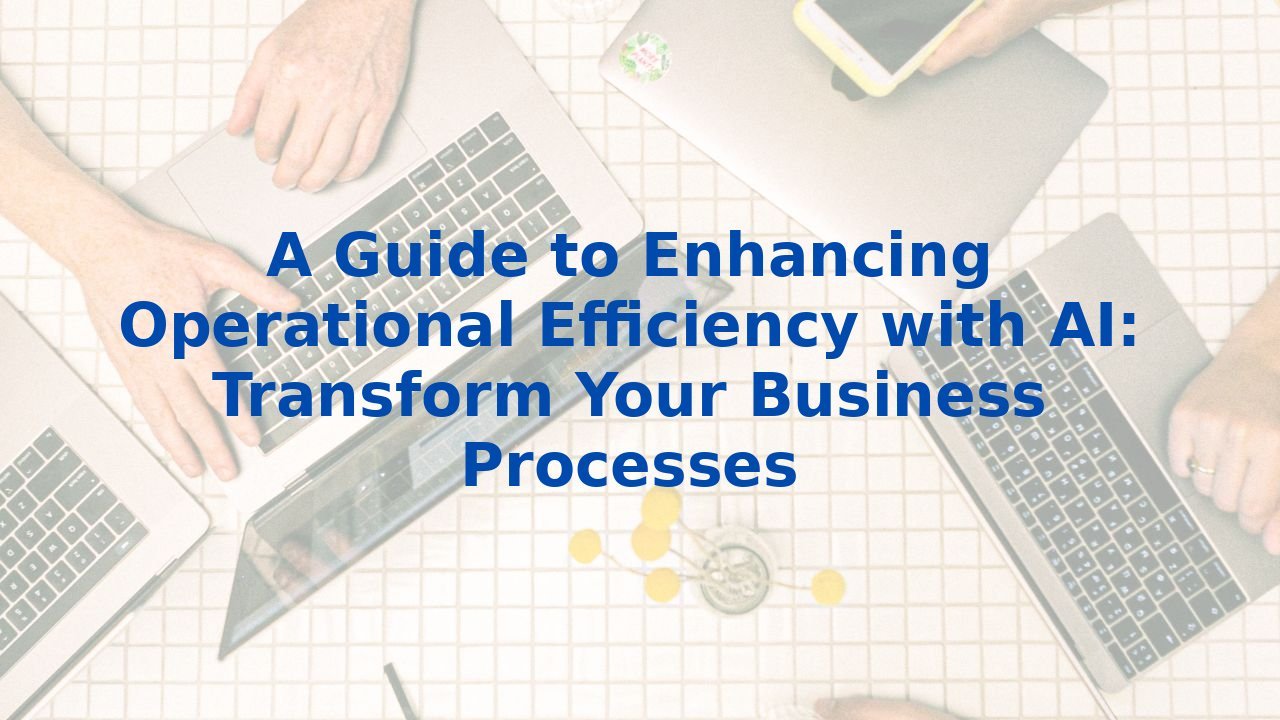A Guide to Enhancing Operational Efficiency with AI: Transform Your Business Processes
A Guide to Enhancing Operational Efficiency with AI: Transform Your Business Processes
In an age where change is the only constant, businesses are under immense pressure to enhance operational efficiency. As organizations seek to streamline their operations and reduce costs, integrating Artificial Intelligence (AI) can be a game-changer. AI goes beyond mere automation; it revolutionizes how businesses approach their processes, driving insights and innovations that were previously out of reach. This guide explores the various business processes that AI can enhance and emphasizes the transformative benefits of AI integration.
1. Automation and Data Analysis
At its core, AI excels in automating repetitive and mundane tasks. Think about all those hours spent on data entry, invoicing, or complex scheduling. By leveraging AI technologies, businesses can eliminate human error, create more efficient workflows, and free up valuable employee time to concentrate on strategic initiatives. This shift from mundane tasks to high-value work is where real innovation happens.
Moreover, AI's prowess in data analysis cannot be overstated. It can sift through mountains of data with unparalleled speed and accuracy. The insights gleaned from this analysis are transformative, enabling businesses to tailor their marketing strategies, pinpoint emerging trends, and adapt to the ever-evolving market landscape. For more insights about AI's role in data analysis, consider exploring resources available in the AI Learning Blog.
2. Real-Time Data Analysis and Decision-Making
Imagine having the power to analyze vast amounts of data in real-time. AI enables organizations to gain instant insights into their operations, fostering swift decision-making. Whether it's monitoring customer interactions, analyzing market trends, or assessing internal processes, AI provides actionable insights that help businesses pivot quickly. This capability not only minimizes human error but also opens doors to new opportunities that can be acted upon immediately.
3. Resource Optimization and Cost Reduction
AI-driven insights lead to optimal resource allocation across various domains – from workforce management to inventory control. By examining current trends and historical data, AI can suggest the most efficient use of resources. This optimization translates directly to significant cost reductions, as organizations can minimize waste and ensure the best utilization of their assets.
4. Personalized Customer Experiences
In today's marketplace, personalization is paramount. AI technologies such as machine learning and natural language processing empower businesses to dissect vast datasets, offering a nuanced understanding of customer preferences and behaviors. This ability to tailor experiences not only enhances customer satisfaction but also fosters deeper loyalty. When customers feel understood, they are more likely to engage meaningfully with a brand.
5. Proactive Issue Resolution
One of the less tangible yet incredibly valuable benefits of AI is its proactive issue resolution capabilities. By identifying anomalies and trends that indicate potential disruptions, AI can empower organizations to act before problems escalate. For instance, in manufacturing settings, AI can monitor equipment conditions and predict maintenance needs, preventing downtime that could disrupt operations. This anticipatory approach keeps operations flowing smoothly and efficiently.
6. Scalability and Adaptability
Today's business environment demands adaptability. Whether scaling operations to meet new market demands or pivoting strategies in response to unforeseen challenges, AI solutions can flexibly adjust to varying workloads. This scalability ensures that organizations remain resilient and agile, positioning them to capitalize on new opportunities and navigate uncertainty with confidence.
7. Investing in Employee Training for AI
While AI can enhance operational efficiency, the importance of employee training cannot be overstated. Empowering employees with a solid understanding of AI algorithms, data interpretation, and analysis techniques is critical. A well-trained workforce can unlock AI's full potential, ensuring informed decision-making and optimized processes. Organizations should consider comprehensive training programs to equip their teams to navigate this new landscape confidently. Explore training options at Complete AI Training to transform your employees into AI advocates.
Conclusion
Integrating AI into operational processes can yield significant benefits, from enhanced efficiency and reduced costs to improved decision-making and personalized customer interactions. By automating routine tasks and leveraging data-driven insights, businesses position themselves for growth and innovation in an increasingly complex marketplace. Embracing AI is not just about technology—it's about reimagining how we operate and connect with our customers. The boundless possibilities of AI will propel organizations into the future, equipping them for success in the ever-evolving digital landscape.
By harnessing the potential of AI and continuously investing in people-oriented training, businesses can navigate the complexities of modern operations with confidence and agility.



